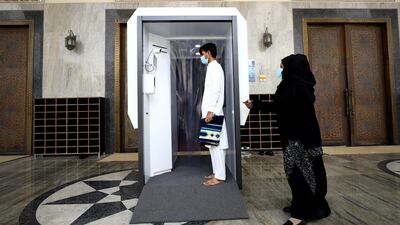Mosques in the UAE will be able to accommodate more worshippers after the Eid holiday.
Capacity limits will be raised to 50 per cent from August 3, Saif Al Dhaheri, the spokesman for the National Emergency, Crisis and Disasters Management Authority (Ncema) said on Wednesday.
Mosques have been operating at 30 per cent capacity since they reopened on July 1, but Friday prayers are still disallowed.
Worshippers will continue to stay two metres apart from one another, said Al Dhaheri.
The period between the call to prayer and the start of prayers will be extended to 10 minutes, except for maghrib prayer, which will be five minutes.
Mr Al Dhaheri said Eid prayers should be performed at home.
The Emirates Council for Sharia Fatwa recommended that donations and sacrifices should be made to official charitable causes in the country.
“We recommend that you donate during this time to the official charitable bodies in the country with sacrifices and donations, through smart applications concerned with sacrifices or through slaughterhouses outlined by the local authorities that guarantee the application of precautionary and preventive measures and provide remote services without the need to enter livestock markets or slaughterhouses,” the authority said on Twitter.
Mr Al Dhaheri said people should avoid visiting family and friends over Eid.
He said people should avoid giving gifts and money to children as eidiyah. They should instead use electronic alternatives to minimise the risk of spreading the virus.
No one should visit pregnant women, children or those with chronic diseases and underlying health conditions.
They should also avoid going out to public places, said Mr Al Dhaheri.
He said maids and domestic helpers should not be allowed to meet anyone outside the home.
Employers should provide their domestic staff with personal protective equipment such as face masks and gloves when dealing with deliveries or receiving goods.























